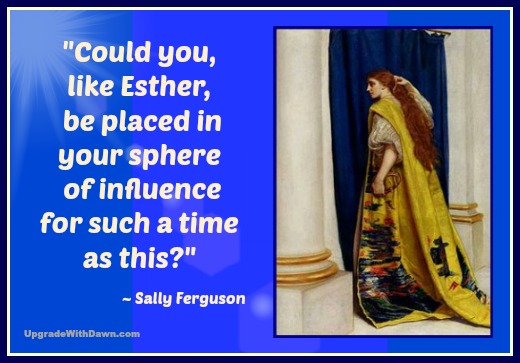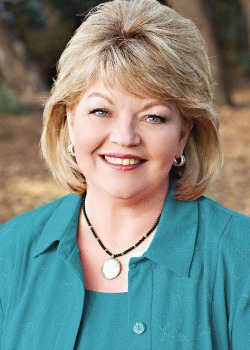How to Be a Woman of Purpose
Practical and biblical, Sally Ferguson invites women to grow in faith as they study God's Word learn how to apply scripture. In this Spiritual Growth UPGRADE, she focuses on a woman in the Bible who became a true Woman of Purpose.
"We can learn some lessons from an orphan gal," Sally said.
I (Dawn) think we can learn lessons from the most unlikely people, if we are alert to how God is using them; and Sally highlights practical lessons from Jewish girl who became an influential queen.
Sally continues . . .
Mordecai and Esther were a part of the contingent living in exile, and as such, they were subject to the decrees of the king of Persia.
One day, the town crier announced a beauty pageant at the king’s palace. The girls were rounded up and transported to the king’s harem.
Did Esther wonder about her purpose during those twelve long months of being sequestered in her quarters? Did she feel forgotten and lost in the crowd of beauties all vying for the king’s heart?
Wonder of all wonders, King Xerxes chose Esther to be his queen and threw a banquet in her honor.
Esther had reached the pinnacle of success in her day, but the red carpet was about to be ripped out from under her sandaled feet.
A man named Haman was cooking up a plot to annihilate the Jews; her people.
What made Esther a woman of purpose?
I believe there are five gems we can see in her life.
1. She was winsome.
Esther won the favor of everyone who saw her (2:15). Verse 17 says she won the king’s favor and approval.
Webster’s Dictionary defines winsome as “generally pleasing and engaging, often because of a childlike charm and innocence.”
Maybe that’s what Paul was referring to when he said in Romans 12:18, “If at all possible… live at peace with everyone.”
He also said in 2 Corinthians 2:14-16 that we are the aroma of Christ to everyone we meet. If our words and our actions are winsome, then we represent the King of Kings!
2. She showed respect.
Esther honored her uncle, even after she was removed from his care. She didn’t abandon her upbringing in her palatial environment (2:20). And when an assassination plot against her husband came to light, she gave the credit back to her uncle for the foiled plans.
That’s a refreshing twist to the story when we live in an era where everyone looks out for #1.
The act of giving deference to another is unselfish and unspoiled. It’s winsome!
3. She cared about the plight of others.
Have you ever cared so much about something that you wept over it? Esther did (8:3).
Isaiah 53:4 says Jesus carried our sorrows and Revelation 7:17 says God will wipe every tear from our eyes.
Who determines the worth of an individual?
Haman and Hitler thought the Jews were expendable.
Today, we have a pandemic of abortions because someone deemed a fetus expendable. Yet, God says every human was made in His image. Isaiah 43:1 says He created us, formed us, redeemed us, summoned us, and we belong to Him.
Esther was a woman of purpose because she cared about others.
4. She sought God.
Esther called for a fast (4:15-16). She had come to the end of herself and realized how much she needed the Lord’s intervention.
It was time to let down the mask of perfection.
It was time to be real about her need.
- Maybe she had gotten by her whole life by her winsomeness and beauty.
- Maybe she had lived a sheltered life and never understood what it meant, to not live in captivity.
But now, the stark reality of her own mortality stares back in the mirror and she tastes fear.
What happens when we crucify our own agenda to seek God’s?
2 Chronicles 7:14 says we connect with forgiveness and healing.
Galatians 2:20 says that’s when we really let Christ reign in our hearts.
Esther became a woman of purpose when she sought God with her whole heart.
5. She sought out answers.
In Esther 5:1, we see Esther breaking the rules for the first time in her life. She went against the law of the land of Persia and approached the king’s throne.
Maybe Esther’s request was the beginning of her thinking for herself?
Previously, we see her following instructions:
- from her uncle,
- from the eunuch in charge of the king’s harem,
- and from the king.
Now, however, Esther seems to have come to a new understanding of what it meant to wear her thinking cap along with her crown, as queen of Persia.
Could it be that her time of seeking God gave a newfound courage to step into who He created her to be? Esther 7:3, 9:13 and 9:29-32 all show Esther using her authority to make a difference.
Where has God placed you? How might He want to use you as His agent of change in that place?
Could you, like Esther, be placed in your sphere of influence for such a time as this?
Sally Ferguson is celebrating 15 years of planning women’s retreats! Her coloring book, What Will I Be When I Grow Up? (Warner Press) and ebook, How to Plan a Women’s Retreat are both available on Amazon. Visit her latest retreat release and her website.
Graphic—Esther by John Everett Millais, 1865—resourced at Wikipedia.
 Post a Comment → Posted on
Post a Comment → Posted on  Tuesday, February 19, 2019 at 10:00AM
Tuesday, February 19, 2019 at 10:00AM  Compassion,
Compassion,  Esther,
Esther,  Purpose,
Purpose,  Queen Esther,
Queen Esther,  Respect,
Respect,  Sally Ferguson,
Sally Ferguson,  Seeking God,
Seeking God,  Upgrade with Dawn,
Upgrade with Dawn,  Winsome,
Winsome,  Woman of Purpose Upgrade Your Life
Woman of Purpose Upgrade Your Life  Purpose,
Purpose,  Spiritual Growth
Spiritual Growth 














